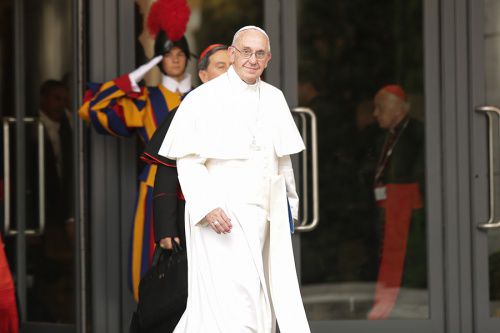Pope Francis announced Thursday to the Synod on the Family that he has chosen to establish a new office in the Roman Curia that will deal with issues of laity, family, and life, as part of his reform of the curia. “I have decided to establish a new Dicastery with competency for Laity, Family and Life, that will replace the Pontifical Council for the Laity and the Pontifical Council for the Family,” Pope Francis said Oct. 22, according to a communique from the Holy See press office. “To this end, I have constituted a special commission that will prepare a text delineating canonically the competencies of the new Dicastery. The text will be presented for discussion to the Council of Cardinals at their next meeting in December." The Pope added that in addition to the pontifical councils for the laity and the family, the Pontifical Academy for Life will also joined to the new office. This move is significant because it streamlines three separate offices into one; it is also meant to give greater attention to issues relating to the laity in the Church. Pope Francis' decision has been widely anticipated since he established, shortly after his March 2013 election as Bishop of Rome, the Council of Cardinals to advise him on the reform of the Roman Curia. The cardinals' council was established in April 2013, and originally included eight cardinals from around the world; its number was later expanded to nine. The group first met in October of that year; at an Oct. 3, 2013 press briefing, Holy See press officer Fr. Federico Lombardi revealed that “the council also plans to give more specific attention to issues relating to the laity, so that this dimension of the life of the Church is properly and effectively recognized and followed by the governance of the Church.” “Now there is a Pontifical Council for the Laity, but it is still possible to think of ways of strengthening this aspect,” he added. Catholic News Agency reported Oct. 30, 2013 that Cardinal Oscar Rodríguez Maradiaga of Tegucigalpa, who co-ordinates the Council of Cardinals, had said that curial reform could develop the laity's role in the Church's ranks by creating a 'Congregation for the Laity', which would include the pontifical councils for the family and the laity, and the Pontifical Academy for Life. It was noted then that the reform of the Roman Curia was expected to streamline the body by reducing the number of pontifical councils, and subsuming them within an increased number of congregations. Pope Francis' announcement called the new office a dicastery — a word which covers both congregations and pontifical councils. While he failed to refer to the new body as a congregation, that can nevertheless be reasonably expected — both given Cardinal Rodríguez' statements, and the fact that it will include two existing pontifical councils. There had been in 2014 some speculation that the expected 'Congregation for the Laity' would also include the Pontifical Council for Health Care Workers, but the Pope's announcement has not borne out that prediction. The Council of Cardinals last met in September, and it was reported at that time that they had formally submitted to the Pope a proposal for a congregation for laity, family, and life. By then, it had been decided that the Pontifical Council for Health Care Workers would not be included in the 'laity congregation', but rather in a second, new, congregation for charity, justice, and peace, which would subsume also the pontifical councils for justice and peace, migrants, and Cor Unum. While Pope Francis' recent announcement does not mention a new dicastery for charity, justice, and peace, it may still be reasonably expected in the coming months. The next meeting of the cardinals' council is scheduled for December. Pope Francis reflected on the program of curial reform in February, at the opening of a consistory of cardinals. Speaking Feb. 12, he emphasized that reform “is always that of promoting greater harmony in the work of the various dicasteries and offices, in order to achieve more effective collaboration in that absolute transparency which builds authentic synodality and collegiality.” “Reform is not an end in itself,” he said, “but a way of giving strong Christian witness; to promote more effective evangelization; to promote a fruitful ecumenical spirit; and to encourage a more constructive dialogue with all.” Pope Francis' reform of the Roman Curia has already resulted in the creation of a Secretariat for the Economy and a Secretariat for Communications. Ultimately, it is expected that assisted by the Council of Cardinals, Pope Francis will promulgate a new apostolic constitution describing the Roman Curia. The curia is currently governed by St. John Paul II's Pastor bonus, which was issued in 1988.

